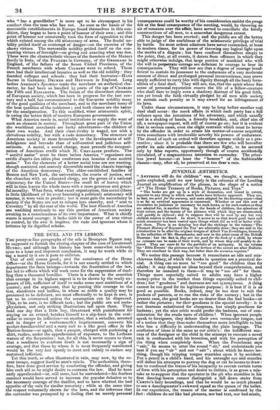THE DUEL AND ITS LESSON.
THE penny-a-line paragraphs of the sale in Brompton Square may be supposed to furnish the closing chapter of the case of Lieutenant MuNao; and although its history has been somewhat tediously spun to a lame and impotent conclusion, it may be worth while to tag a moral to it ere it pass to oblivion. Out of evil comes good ; and the connivance of the Home Office—or the Horse Guards, for it is not exactly settled to which department the fame belongs—towards the frustration of the law, has led to effects which will work more for the suppression of duel- ling than a thousand homilies. There is a charm in the assertion that courage in its highest aspect is to be shown by the ready ex- posure of life, sufficient of itself to make some men ambitious of a quarrel; and the argument, that by putting this courage to the test, slanderers and bullies, in whom so noble a quality may be presumed to be deficient, are most effectually to be kept in awe, is not to be overturned unless the assumption can be disproved. This, to be sure, is no difficult task ; but the public are not meta- physicians, and only striking illustrations tell upon them. They read one day that a little boy, threatened with punishment for staying on an errand, betakes himself to a slip-knot in the coal- cellar to escape its infliction—on another, that a swindler, arrested and in danger of a twelvemonth's imprisonment, converts his pocket-handkerchief and a rusty nail to a like good office in the Station-house—or again, that a pauper, charged with purloining a shirt, rushes, under the apprehension of exposure, to the Lethean waters of the Serpentine : but, for all this, it never occurs to them that a readiness to confront death is not necessarily a sign of courage, and that those by whom it is most frequently manifested would be the very last openly to meet and calmly to endure any sustained infliction.
Yet this truth, so often illustrated in vain, may now, by the re- cent escape, suggest itself to men's minds. The authorities, there- fore, have done good service by comforting the offender, and giving him such aid as he might desire to contemn the law. Had he been early apprehended—or, still more, had he surrendered—his fearless conduct would have served to increase the popular delusion as to the necessary courage of the duellist, and to have whetted the bad appetite of the vain for similar notoriety ; while at the same time the respect voluntarily shown for the laws, and the inference that the surrender was prompted by a feeling that no merely personal
consequences could be worthy of his consideration amidst the pangs felt at the fatal consequence of the meeting, would, by throwing an air of romance over the affair, have served to conciliate the kindly constructions of all men, to a somewhat dangerous extent.
This danger has been averted ; and the public are all the better able to judge of the usefulness of the aristocratic privilege of trial by battle. Its most ardent admirers have never contended, at least in modern times, for its power of throwing any logical light upon the merits of a dispute ; but have confined themselves simply to the point, that, at all events, it deters from offences in which they might otherwise indulge, that large portion of mankind who with the will to perpetrate outrage are deficient in courage to bear its consequences. They will now see that a degree of courage insuf- ficient to sustain its possessor to the endurance of a very moderate amount of direct and prolonged personal inconvenience, may prove amply sufficient to carry him with dignity through all the hasty form- alities of a fatal duel. They will see, too, that the spirit whose fine sense of personal reputation exacts the life of a fellow-creature who shall dare to imply even a shadowy distrust of his good faith, can yet break the faith virtually pledged by all men with society to sustain such penalty as it may award for an infringement of its laws.
Under these circumstances, it may be long before another real duel shall occur : the mock affairs in which each party has a full reliance upon the intentions of his adversary, and which usually end in a shaking of hands, a friendly breakfast, and, chief aim of all, a newspaper-report, will still of course go on ; but it is evident that in serious cases, even the slight restraint which must be borne by the offender in order to attain his matter-of-course acquittal, tests sometimes with intolerable severity his powers of endurance. The dread of such an ordeal will therefore operate widely as a pre- ventive; since it is probable that there are few who will hereafter prefer its sole alternative—an ignominious flight, to be secured only by false reports, opportunely though of course accidentally circulated, of a magnanimous intention to surrender. The price- less jewel honour—at least the "honour" of the fashionable classes—may, after all, be preserved at too dear a rate.


























 Previous page
Previous page